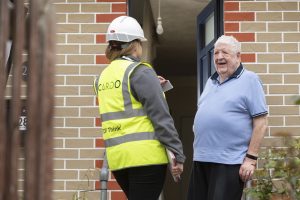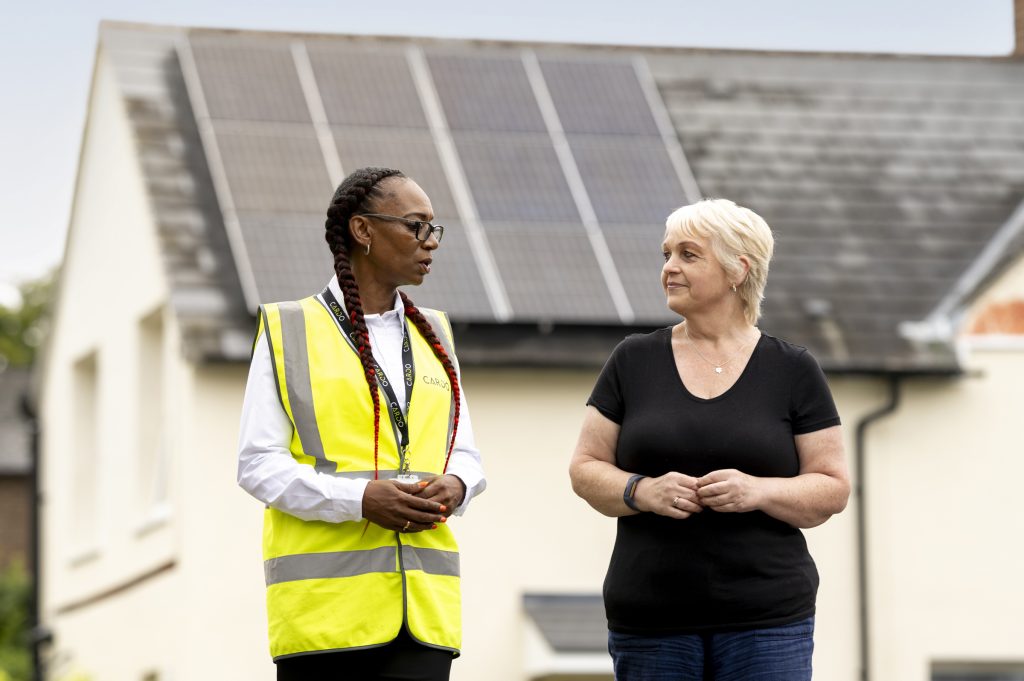Compliance and safety are critical components of property management, social housing, and commercial real estate. Whether maintaining government buildings, social housing units, or commercial facilities, ensuring full compliance with UK safety regulations is essential to protect occupants, meet legal requirements, and reduce risks.
At Cardo Group, we specialise in Compliance & Safety Services, providing comprehensive safety inspections, risk assessments, and regulatory compliance management for landlords, housing associations, businesses, and public sector organisations. Our goal is to ensure that buildings remain safe, legally compliant, and fully functional for tenants, employees, and the public.

Ensuring compliance with UK building regulations and safety laws is not just a legal requirement—it is essential for:
Protecting tenants and employees from hazards – Ensuring that properties are free from fire risks, electrical faults, poor ventilation, and structural issues is essential for safety. A proactive compliance strategy helps prevent accidents, improve indoor air quality, and create a secure living or working environment, reducing potential health hazards and liabilities for property owners.
Avoiding financial penalties due to non-compliance – UK safety regulations require strict adherence to fire, gas, electrical, and building standards. Failure to comply can result in hefty fines, legal action, and loss of business licenses. Regular safety inspections and compliance checks help businesses and landlords stay within legal guidelines and avoid unnecessary financial risks.
Reducing long-term maintenance costs – Addressing minor safety risks early prevents them from escalating into major, costly repairs. Regular maintenance of fire systems, electrical wiring, plumbing, and ventilation ensures that properties remain functional, safe, and efficient, reducing emergency repair expenses and extending the lifespan of essential building infrastructure.
Maintaining business continuity – Non-compliance can lead to forced facility closures, operational downtime, and reputational damage. Ensuring that all safety measures, emergency systems, and building regulations are up to date keeps businesses and public facilities operating smoothly, preventing interruptions that could affect tenants, employees, and essential services.
Enhancing property value – Well-maintained buildings with up-to-date compliance certifications retain their value and attract tenants, investors, and businesses. Regular inspections, safety upgrades, and proactive maintenance contribute to higher occupancy rates, improved tenant satisfaction, and a better market reputation, making properties more profitable and sustainable in the long run.
By implementing a proactive compliance and safety strategy, property owners and managers can ensure long-term legal compliance, protect tenants, and reduce financial liabilities.

At Cardo Group, we provide a comprehensive range of Compliance & Safety Services tailored to meet the unique needs of social housing providers, landlords, commercial businesses, and public sector organisations.
Fire safety compliance is a legal requirement for all commercial and residential buildings in the UK. Our services include:
Fire risk assessments to identify and eliminate potential hazards – Regular fire risk assessments help detect flammable materials, faulty wiring, and blocked escape routes before they become major threats. Identifying and addressing fire hazards early ensures compliance with UK Fire Safety Regulations, reducing the risk of injuries, property damage, and legal penalties.
Installation and servicing of fire alarms, smoke detectors, and sprinkler systems – Fire detection and suppression systems must be regularly maintained to ensure early warning and effective response in case of an emergency. Regular servicing of fire alarms, smoke detectors, and sprinkler systems guarantees that all fire safety equipment functions efficiently and meets legal requirements.
Emergency lighting inspections to ensure safe evacuation routes – In the event of a power failure or fire, properly functioning emergency lighting helps guide occupants to safe exits. Routine inspections ensure that escape route lighting is visible, functional, and compliant with UK safety standards, reducing risks during evacuations.
Fire door checks and compartmentalisation measures to prevent fire spread – Fire doors and compartmentalisation are essential for containing fires and preventing rapid spread within a building. Regular inspections ensure that fire doors close securely, seals remain intact, and partitions are structurally sound, improving occupant safety and minimising fire damage.
Staff training on fire safety procedures for workplaces and public buildings – Employees and tenants must be trained on fire prevention, emergency response, and evacuation procedures. Fire safety training equips individuals with the knowledge to react quickly in emergencies, use fire extinguishers correctly, and follow evacuation protocols, ensuring a safer environment for all occupants.
By ensuring full fire safety compliance, property owners can protect lives, prevent property damage, and meet UK Fire Safety Regulations.
All properties must comply with gas and electrical safety regulations to prevent accidents, fires, and legal issues. Our expert teams provide:
Fixed wire testing (EICR) for commercial and residential buildings – Electrical Installation Condition Reports (EICR) are essential for identifying faulty wiring, overloaded circuits, and potential fire hazards. Regular fixed wire testing ensures electrical safety compliance, reduces the risk of electrical fires, and protects tenants, employees, and property assets in both commercial and residential buildings.
Gas appliance servicing and Carbon Monoxide (CO) testing – Faulty gas appliances can lead to gas leaks, fires, or carbon monoxide poisoning, posing severe risks to occupants. Regular gas servicing and CO testing ensure appliances are functioning safely and efficiently, preventing health hazards and ensuring compliance with UK gas safety regulations.
PAT (Portable Appliance Testing) for electrical safety compliance – Portable Appliance Testing (PAT) involves checking electrical equipment for faults, wear, and damage to prevent electric shocks and fire risks. Routine PAT inspections are required for commercial buildings, rental properties, and workplaces to ensure all plug-in electrical appliances remain safe for use.
Boiler inspections and heating system checks to prevent breakdowns – Regular boiler servicing helps maintain energy efficiency, reduce carbon emissions, and prevent unexpected failures, especially during colder months. Inspections identify leaks, pressure issues, and faulty components, ensuring heating systems remain safe, reliable, and compliant with gas safety standards.
Emergency gas and electrical fault response services – Gas leaks, electrical failures, and power outages can create serious safety hazards if not addressed immediately. A 24/7 emergency response service ensures that trained professionals can quickly diagnose and fix faults, preventing property damage, injuries, and costly business disruptions.
With regular safety inspections, businesses and landlords can ensure full compliance with UK energy and utility regulations, avoiding legal disputes and tenant complaints.
Legionella bacteria in water systems can cause serious health risks, making water hygiene compliance essential. Cardo Group provides:
Legionella risk assessments and monitoring – Legionella bacteria can thrive in water systems, posing a serious health risk through Legionnaires’ disease. Regular risk assessments and monitoring help detect potential contamination, ensuring that cooling towers, water storage tanks, and pipework meet UK health and safety standards to protect tenants and employees.
Water tank cleaning and disinfection – Over time, bacteria, biofilm, and sediment can accumulate in water tanks, leading to contaminated water supplies. Routine cleaning and disinfection eliminate harmful pathogens, ensuring that stored water remains safe for drinking, washing, and heating systems, while preventing the growth of Legionella bacteria.
Pipework and plumbing inspections to prevent contamination – Corroded or poorly maintained pipes and plumbing systems can cause water contamination and leaks, leading to serious health risks and property damage. Regular inspections and maintenance ensure that plumbing remains structurally sound, free from bacterial buildup, and compliant with UK water safety regulations.
Temperature control monitoring for safe water supply – Water systems must maintain specific temperature ranges to prevent Legionella growth. Monitoring and adjusting hot and cold water systems ensures water remains safe for use, minimising health risks and meeting compliance standards for workplaces, housing, and public sector buildings.
By ensuring water systems remain free from bacteria and contamination, property owners protect tenant and employee health while maintaining legal compliance.
Workplaces, social housing units, and public facilities must comply with the Health & Safety at Work Act 1974 to protect occupants from hazards, injuries, and unsafe conditions. Our services include:
Full building health and safety risk assessments – Conducting comprehensive risk assessments helps identify potential hazards in workplaces, residential buildings, and public spaces. Evaluating fire safety, electrical risks, structural integrity, and environmental hazards ensures compliance with UK Health & Safety laws, protecting employees, tenants, and visitors from preventable accidents and legal liabilities.
Hazard identification and mitigation strategies – Proactively spotting slip-and-trip hazards, poor ventilation, faulty equipment, and structural weaknesses allows property managers and business owners to implement targeted mitigation strategies. This includes installing safety signage, improving emergency exits, and enforcing regular maintenance protocols to create a safer and legally compliant environment.
Employee and tenant safety training – Ensuring that staff and residents understand emergency procedures, fire safety, and first aid protocols significantly reduces accident risks. Regular health and safety training sessions equip employees and tenants with the knowledge to identify hazards, follow workplace safety guidelines, and respond effectively to emergencies.
Accident prevention planning and policy development – Implementing a robust safety policy helps organisations minimise workplace accidents and ensure regulatory compliance. This includes establishing clear safety protocols, enforcing PPE requirements, maintaining equipment, and conducting regular safety drills to create a culture of safety and risk awareness.
Workplace ergonomics assessments to improve safety in offices and commercial spaces – Poor workstation setup, repetitive strain, and improper lifting techniques can lead to musculoskeletal injuries and reduced productivity. Ergonomic assessments help optimise desk layouts, seating arrangements, lighting conditions, and equipment placement, ensuring a healthier, more efficient, and comfortable workspace.
By implementing robust health and safety measures, organisations can reduce workplace accidents, improve productivity, and comply with legal obligations.
Buildings must be accessible to all individuals, including those with disabilities and mobility challenges. Our accessibility compliance services include:
Wheelchair ramp installations and lift maintenance – Ensuring seamless accessibility for individuals with mobility challenges is essential in public and commercial buildings. Installing wheelchair ramps, stairlifts, and maintaining elevators guarantees that disabled tenants, employees, and visitors can navigate spaces safely, complying with UK accessibility laws and promoting inclusive environments.
Accessible restroom modifications – Public and workplace restrooms must accommodate people with disabilities, ensuring ease of use, safety, and dignity. Modifications such as widened doorways, grab rails, automatic taps, and emergency call systems enhance accessibility, ensuring compliance with building regulations while improving facilities for disabled occupants.
Signage and wayfinding improvements for visually impaired individuals – Clear and accessible signage helps visually impaired individuals navigate buildings, transport hubs, and public spaces independently. Installing Braille and tactile signs, high-contrast lettering, and auditory wayfinding systems ensures better accessibility, making spaces more inclusive and compliant with UK disability regulations.
Workplace adaptations for disabled employees – Employers must create inclusive work environments for disabled employees by providing ergonomic seating, height-adjustable desks, voice-activated technology, and assistive software. These adaptations ensure equal opportunities, improved productivity, and legal compliance, fostering a workplace culture of diversity and accessibility.
Compliance audits for Equality Act 2010 requirements – Regular accessibility audits assess whether buildings, workspaces, and public facilities meet legal obligations under the Equality Act 2010. Audits review entryways, restroom accessibility, signage, and workplace accommodations, ensuring full compliance with UK disability inclusion standards while improving public and employee experiences.
By making properties more inclusive and accessible, businesses and public sector organisations enhance their reputation while meeting legal requirements.
At Cardo Group, we offer customised compliance and safety services to help landlords, businesses, and public institutions achieve full legal compliance and create safe environments for tenants and employees. Our approach includes:
Tailored compliance plans based on property type and usage.
24/7 emergency response teams for urgent safety concerns.
Expert legal guidance on UK compliance regulations.
Data-driven risk assessment and monitoring solutions.
Ongoing safety audits to maintain long-term compliance.
By partnering with Cardo Group, businesses and property managers can reduce risk exposure, improve safety, and ensure properties remain compliant with evolving regulations.

As UK safety regulations continue to evolve, organisations must take a proactive approach to property compliance and risk management. By investing in comprehensive Compliance & Safety Services, property owners and managers can:
Avoid costly fines and legal action.
Ensure tenant and employee safety.
Improve building efficiency and sustainability.
Reduce long-term maintenance costs through preventative safety measures.
Maintain a positive reputation in the housing and business sectors.
At Cardo Group, we are committed to helping landlords, businesses, and public sector organisations stay compliant, safe, and prepared for the future. Our expertise in property safety, risk management, and regulatory compliance makes us the leading choice for Compliance & Safety Services in the UK.